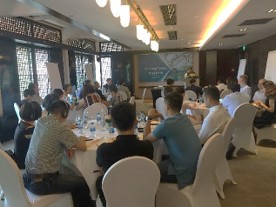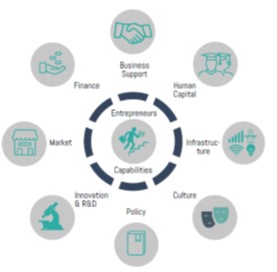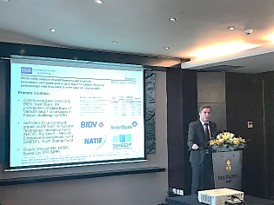Vietnam’s entrepreneurial ecosystem – new perspectives
The Dutch Good Growth Fund (DGGF), in cooperation with the Embassy of the Netherlands in Vietnam, partnered with EMC Consulting, the Mekong Business Initiative, Vietnam Angel Investor Network, and Saigon Innovation Hub to gather local stakeholders in Hanoi and Ho Chi Minh City, to discuss new perspectives on Vietnam’s entrepreneurial ecosystem.
On 15 and 17 May 2018, local stakeholders from Vietnam’s entrepreneurial ecosystem gathered at two workshops in Hanoi and Ho Chi Minh City to share their appreciation of the strengths and weaknesses of the ecosystem and elaborate together potential solutions to contribute to a more conducive operating environment for local entrepreneurs and their businesses. Over 65 representatives from financial institutions, business associations, development organisations, the government, business support service providers, educators, corporates and entrepreneurs took part in the events.
EMC Consulting was commissioned by the Dutch Good Growth Fund (DGGF) to undertake a study in the Mekong region, covering Cambodia, Lao PDR, Myanmar and Vietnam (#ClosingTheGap Mekong). The DGGF is an initiative of the Dutch Ministry of Foreign Affairs which seeks to improve underserved small and medium-size enterprises’ (SMEs) access to the financial backing they need to grow. The so called “missing middle” are enterprises who have outgrown micro-finance but do not yet have access to regular financial services. The methodology was piloted in Kenya in 2015 and scaled to a regional level in francophone West Africa in 2017 using the Aspen Network of Development Entrepreneurs’ framework for ecosystem assessment. This framework was modified for #ClosingTheGap Mekong by adding entrepreneurs’ capabilities at its centre.
The research approach draws on analysis of existing SME data sets and an extensive literature review, as well as outcomes of interviews undertaken with entrepreneurs, start-ups, and relevant financial and non-financial institutions in the ecosystem. The workshops bring together those stakeholders to review, validate and challenge research findings to date and engage in an interactive session towards elaborating solutions to address gaps identified in the ecosystem. Conclusions from the workshop are directly captured in the final report and thus inform ecosystem support programs.
Analysis of the World Bank 2016 Enterprise Survey shows that while nearly a third of Vietnam’s SME sector is composed of small businesses experiencing relatively low rates of annual revenue growth (0-10%), another third is growing very quickly at more than 20% per annum. This is the largest proportion of all countries in the #ClosingTheGap Mekong study.
Vietnam also has a small but active community of innovative start-ups and entrepreneurs, as evidenced by growing interest from angel investors and venture capitalists, which made over 90 publicly announced investments in 2017, nearly double the amount of 2016.
Local entrepreneurs of all types recognize the need to increase their ‘entrepreneurial capabilities’, which was categorized as the main constraint to grow their business. As confirmed during the workshop, they require further support in business operations, strategic planning as well as acquiring finance.
Participants gathered into small working groups to work on specially developed case studies outlining different profiles of entrepreneurs, at a specific development stage of their business, and with identified needs.
Solutions put forward to increase the conduciveness of the ecosystem to local entrepreneurs and their businesses include:
– Government financial support such as grants or tax incentives to support innovation and start-up growth; including business model innovation, R&D, and the development of Intellectual Property.
– The establishment of a permanent “entrepreneur support office” as a one stop shop to access information and services.
– Closer integration of entrepreneurial skills in the education system, closing the human resource gap.
– A capacity building program for financial institutions providing debt financing, to improve credit assessments, enabling and lowering costs of SME lending by reducing reliance on hard collateral.
– Improve platforms for connecting ecosystem stakeholders and networking, to increase collaboration amongst entrepreneurs, potential investors, mentors, and specialized support associations.
The recommendations put forward will be refined and elaborated in the final report #ClosingTheGap Vietnam which is expected to be finalised by the end of August 2018 and made available to the public through DGGF’s website.
—-
Related posts include:
Not all SMEs in the Mekong region are alike
Financing challenges for SMEs in the Mekong region




Comments are closed.